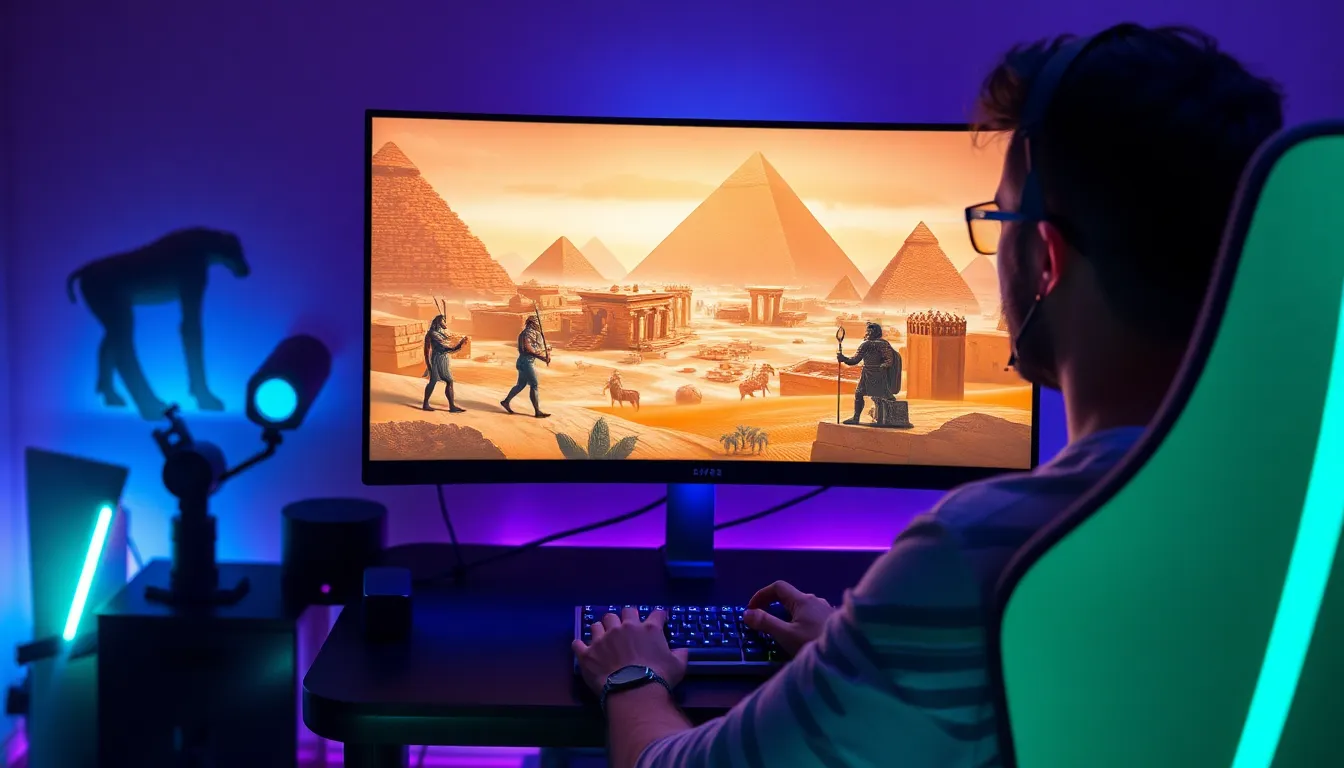Imagine wandering through the sprawling sands of Ancient Egypt, all while sitting comfortably on your couch. Sounds impossible, right? Wrong. The world of gaming has found a way to transport players to this intriguing civilization. In this text, we’ll jump into the vast influence Ancient Egypt has on modern gaming, uncovering iconic games, storytelling techniques, and valuable lessons for developers. Buckle up: the journey through the pyramids and beyond is about to begin.
Table of Contents
ToggleExploring Ancient Egyptian Influence In Gaming

Ancient Egypt has always been a source of fascination for many. Its rich history, mysterious deities, and legendary monuments like the pyramids evoke endless curiosity. From Hollywood blockbusters to the realm of video games, the allure of this ancient civilization brings stories to life.
Games like Assassin’s Creed Origins serve as a perfect entry point, immersing players in the bustling streets of ancient Memphis. Here, players don’t just observe, they experience the daily life of an assassin trying to uncover deeper conspiracies. This blend of exploration and action not only educates gamers about this fascinating era but also keeps them engaged for hours.
Also, Ancient Egyptian mythology is a treasure trove of inspiration. The diverse pantheon, filled with gods and goddesses, provides ample material for character development and plot twists. Picture traversing through lands under the watchful eye of Horus or fighting battles with the ferocity of Sekhmet. The possibilities are endless, proving that Ancient Egypt has cemented its place in the gaming world in ways that extend beyond mere visuals.
Iconic Ancient Egyptian Games
There’s no shortage of games that have embraced the charm of Ancient Egypt. Renowned titles often use the backdrop of flaming sunsets and towering temples to create an enchanting setting.
The Representation Of Ancient Culture In Games
Take Pharaoh, for instance, this classic city-building game invites players to lead their own Egyptian civilization. Players not only build and manage cities but also investigate into aspects of society such as trade, religion, and art. This meticulous detail encourages gamers to appreciate the nuances of ancient culture, offering a taste of what daily life might have really been like.
Building Historicity Through Gameplay Mechanics
Similarly, The Curse of the Pharaohs expansion for Assassin’s Creed Origins successfully ties gameplay mechanics to historical events. Action-packed quests mixed with combat encourage players to learn about the ancient civilization while ensuring that the entertainment factor remains paramount. This fusion of learning and gaming exemplifies how educational elements can be seamlessly woven into an exciting narrative.
Storytelling Techniques Inspired By Ancient Egypt
The storytelling prowess of games set in Ancient Egypt deserves a spotlight of its own. The narrative style employed frequently draws players deeper into the lore of this ancient society.
The Aesthetics Of Ancient Egyptian Design
Rich visuals reminiscent of hieroglyphics and stunning landscapes make for an immersive experience. Colors of gold and blue dominate the aesthetic landscape, echoing the grandeur associated with the pharaohs. In Destiny 2, for example, players explore the Pyramidion, which not only features captivating scenery but also complex quests that unravel the larger mysteries at play.
Character and World Design Elements
Character design also pays homage to Egyptian influence. Characters in games often sport intricate designs and costumes reminiscent of historical artifacts. Whether it’s the nobility adorned with gold jewelry or the warriors equipped with distinctive weaponry, these choices help transport players straight to the heart of this ancient civilization.
Lessons For Modern Game Developers
Game developers looking to incorporate elements from Ancient Egypt can draw numerous insights from existing titles.
Integrating Ancient Egyptian Elements Into Gameplay
First off, blending gameplay with cultural elements can lead to deeper engagement. For example, developers can encourage players to complete tasks that mirror ancient rituals, so adding layers to the gameplay experience. Implementing mythology-based side quests can also inject excitement and wonder, as players explore diverse stories from Egyptian mythology.
Balancing Fantasy With Historical Accuracy
But, it’s crucial to strike a balance between fantasy and historical accuracy. While creative liberties can enhance gameplay, grounding stories in factual elements allows players to gain a richer understanding of this ancient civilization. Ensuring that the representation of gods, architecture, and cultural practices is well-researched can make the gaming experience both enjoyable and educational.








